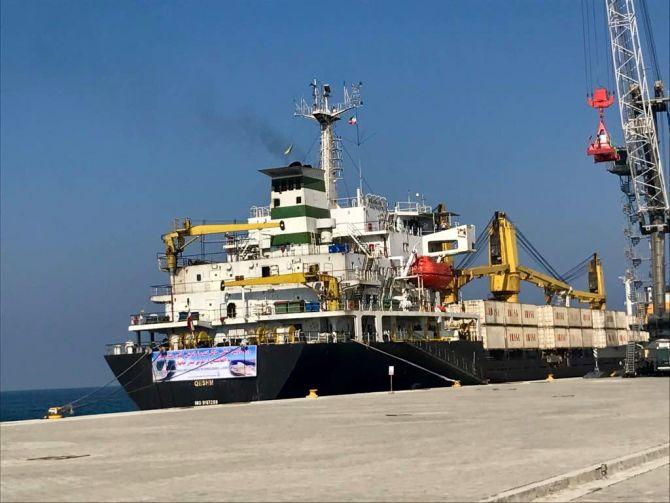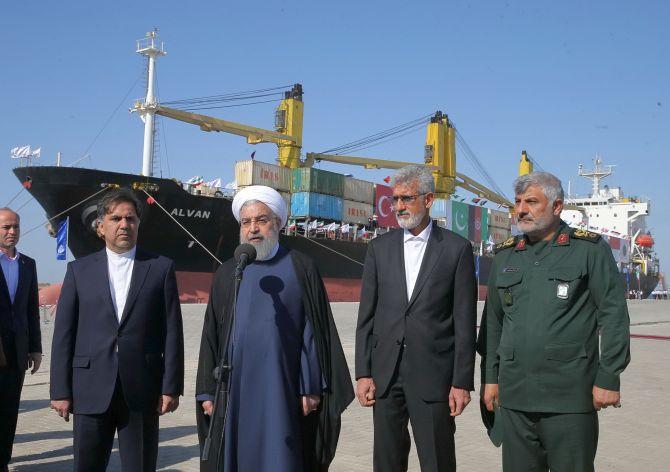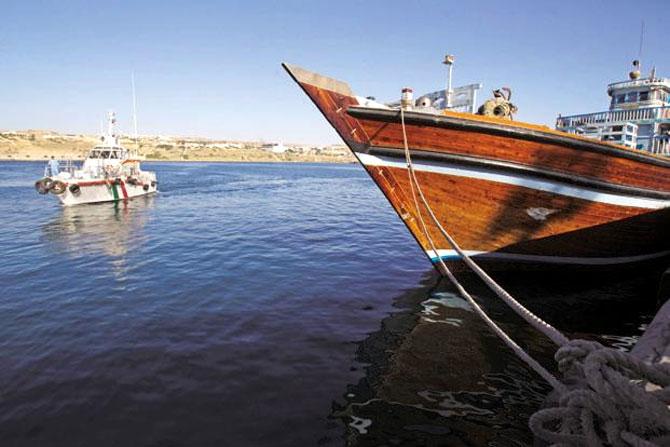 | « Back to article | Print this article |
Iran's decision to keep India out and welcome China to the scene is a huge strategic setback for India, observes Dr Rajaram Panda.

When the news of Iran shunting India out from the key Chabahar port rail project, citing that India was delaying funding and other associated aspects surfaced, the strategic community in India quickly saw a hidden Chinese plot behind this.
Seen from a larger perspective, one cannot miss reading the ever-expanding Chinese footprint on Iran's decision if one joins the dots of China's other expansionist activities in many sectors of Asia and against the background of the impending China-Iran deal involving a colossal package worth $400 billion, to be spread over the next two decades-and-a-half.
Understandably, this unexpected development that came four years after India and Iran had reached an agreement to construct the 628 km rail line along the Iran-Afghanistan border was a clear surprise.
Though Iran has left the door open for India to join at a later date, while deciding to fund and develop the rail link under the second phase of the Chabahar port on its own, the Iranian decision is a huge strategic setback to India-Iran ties.
As part of the deal, India had developed the first phase of the project to modernise Chabahar port, and now operates it.
India was also to be part of the second phase from Chabahar port to Zahedan, but was constrained to go slow due to sanctions imposed by Unted States President Donald J Trump after annulling the nuclear deal signed by the Obama administration.
India had to strike a delicate balance between its ties with the US and Iran and preferred to go slow despite Iranian push.
Given China's aggressive push to expand its influence globally by either flexing its military muscle and intimidate its smaller Asian neighbours on territorial issues and by digging historical claims with no legal basis or by offering money on concessional terms with tougher conditions with intentions to create debt trap and thereby economic domination, its latest warming of ties with Iran has the same imprint.
It is a matter of regret that Iran has failed to see China's hidden agenda and been trapped to its design by negotiating a large economic package and junking the high-profile, big-ticket and much-touted project it signed with one of its oldest allies, India.
That China pulled the strings behind the scene cannot be doubted.

As per available reports, Iran has already inaugurated the track-laying process.
The line, which as per the plan will eventually reach Zaranj in Afghanistan, is supposed to be completed by March 2022.
Indian public companies, IRCON and Rites, were awarded the second phase of the project to develop the rail link connecting the south-eastern port city of Chabahar to Zahedan, the provincial capital of Sistan-Baluchestan region, and from Zahedan to Sarakhs at the border with Turkmenistan.
This strategic transit is part of Iran's International North-South Transit Corridor, which will significantly reduce the traditional trade routes between the markets of India and the European and Commonwealth of Independent States countries.
The link was intended to boost the Iranian economy.
With India out for now, China shall have a free rein to make its own space and expand its larger strategic designs.
The Chabahar pact was signed during Prime Minister Narendra Damodardas Modi's visit to Iran in 2016.
The primary objective was to set up a new trade route to Afghanistan and Central Asia -- a transit and transportation corridor.
As per the tie-up between the Indian Railways Construction Ltd. (IRCON) and Iranian Railways as part of a trilateral project among Iran, Iran and Afghanistan, India had promised to provide $1.6 billion for 'all services, superstructure work and financing'.
Iran now announces it will pool $400 million from the Iranian National Development Fund to go ahead with the rail line without Indian help.
It was not that India had shown lack of commitment to its obligations.
In fact, Indian engineers visited the site many times to start its work on the second phase of expansion.
However, things slowed down after Trump imposed sanctions and India was apprehensive of possible US reprisals and halted the project.
This, despite the US had agreed to a waiver for the Chabahar port and the rail line.
This was because IRCON feared that equipment suppliers and project partners would not be able to meet their requirements, thereby adversely impacting the project's execution.
China judged the situation and quickly took advantage to enter the scene and exploited Iran's vulnerability by offering an attractive economic package that Iran could not refuse.
As per the deal China entered with Iran, China will assist Iran in Chabahar's duty free zone, an oil refinery nearby and possibly a larger role in Chabahar port as well.
Promises of investment in infrastructure development, manufacturing and upgrading energy and transport facilities, refurbishing ports, refineries and other installations would bind Iran in such a way that it would be difficult for it to get out if it wishes to do at a future date.
The Chinese stranglehold on Iran and its economy would have been enhanced a great deal, a typical strategy it has adopted with many African countries in executing its BRI projects.
The deal also commits Iran to supplying oil and gas to China for the whole duration, thereby Iran falling into Beijing's trap.
The possibility of Iran leasing out the Chabahar port to China at a later date cannot be ruled out. If that happens, China would have extended its strategic reach to the Pakistan-Iran coast.

Since Iran has said that India is still welcome to join the project, how India will play its cards -- should it circumvent US sanctions and compete with China in the same project? -- remains to be seen.
Earlier, China had refrained from commenting when India and Iran launched the Chabahar port, though it noticed the project's strategic importance as it allowed India to trade directly with Afghanistan, besides rivalling Pakistan's Gwadar port.
It also reflected the growing convergence of interests among India, Iran and Afghanistan.
Chabahar Port in Iran's Sistan-Balochistan province on the energy-rich nation's southern coast is easily accessible from India's western coast and was increasingly seen as a counter to Pakistan's Gwadar port, developed with Chinese investment, which is located around 80 km from Chabahar.
Chabahar port was being considered a gateway to golden opportunities for trade by India, Iran and Afghanistan with Central Asian countries besides ramping up trade among the three countries in the wake of Pakistan denying transit access to New Delhi.
Iran's decision to keep India out and welcome China to the scene is a huge strategic setback for India.
Iran's strategic worldview showed signs of change after tensions between the US and Iran increased after Trump annulled the nuclear deal and imposed sanctions.
It was then that Iran reached out to China.
Iranian Foreign Minister Mohammad Javad Zarif has made several trips to China in the past year.
Tehran's reaching out to Beijing was seen as an attempt to strengthen the perception that Iran has a 'solid international partnership' with China when Iran confronts international isolation and pressure.

During his visit to Tehran in January 2016, Chinese President Xi Jinping proposed that both sides establish their ties based on a Comprehensive Strategic Partnership. Soon after, discussions began to conclude the 25-year bilateral pact.
The proposal was backed by Iran's Supreme Leader Ayatollah Ali Khamenei who has said the agreement was 'wise'.
Though details of the agreement have not been revealed, critics have started comparing the proposed deal to the 1828 Treaty of Turkmenchay between Persia and Tsarist Russia, under which the Persians ceded control of authority in the South Caucasus.
China has taken advantage of Iran's weakness -- its economy is under strain because of the harsh US sanctions -- and negotiated a pact from a position of strength.
China will have easy access to Iran's natural resources for many years to come.
China has been flooding markets in Iran with its products, thereby crippling domestic manufacturers and pushed out Iranian businesses.

Former Iranian president Mahmud Ahmadinejad highlighted the manner in which the China-Iran pact was being negotiated, keeping the Iranian people in the dark.
The US state department referred to the planned agreement as a 'second Turkmenchay', accusing the Iranian government of being afraid to reveal details of the pact with the Iranian people as the terms are probably not beneficial to the people.
It would be in Iran's long-term interest to rethink and reconsider the pact with China before it is too late.
Failing to do so would leave the country entangled with an arrangement that could drive the Iranian nation into a perilous future.
Dr Rajaram Panda, former Senior Fellow at IDSA, was until recently ICCR India Chair at Reitaku University, Japan.
He is currently the Lok Sabha Research Fellow, Parliament of India, and member of the governing council, Indian Council of World Affairs, New Delhi.
Feature Production: Aslam Hunani/Rediff.com